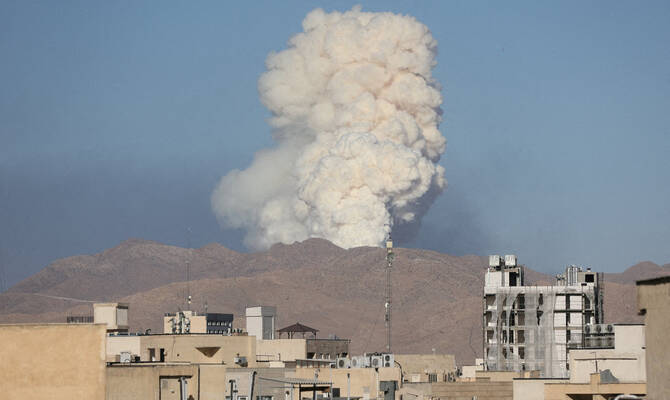WASHINGTON: Elon Musk’s AI chatbot Grok produced inaccurate and contradictory responses when users sought to fact-check the Israel-Iran conflict, a study said Tuesday, raising fresh doubts about its reliability as a debunking tool.
With tech platforms reducing their reliance on human fact-checkers, users are increasingly utilizing AI-powered chatbots — including xAI’s Grok — in search of reliable information, but their responses are often themselves prone to misinformation.
“The investigation into Grok’s performance during the first days of the Israel-Iran conflict exposes significant flaws and limitations in the AI chatbot’s ability to provide accurate, reliable, and consistent information during times of crisis,” said the study from the Digital Forensic Research Lab (DFRLab) of the Atlantic Council, an American think tank.
“Grok demonstrated that it struggles with verifying already-confirmed facts, analyzing fake visuals, and avoiding unsubstantiated claims.”
The DFRLab analyzed around 130,000 posts in various languages on the platform X, where the AI assistant is built in, to find that Grok was “struggling to authenticate AI-generated media.”
Following Iran’s retaliatory strikes on Israel, Grok offered vastly different responses to similar prompts about an AI-generated video of a destroyed airport that amassed millions of views on X, the study found.
It oscillated — sometimes within the same minute — between denying the airport’s destruction and confirming it had been damaged by strikes, the study said.
In some responses, Grok cited the a missile launched by Yemeni rebels as the source of the damage. In others, it wrongly identified the AI-generated airport as one in Beirut, Gaza, or Tehran.
When users shared another AI-generated video depicting buildings collapsing after an alleged Iranian strike on Tel Aviv, Grok responded that it appeared to be real, the study said.
The Israel-Iran conflict, which led to US air strikes against Tehran’s nuclear program over the weekend, has churned out an avalanche of online misinformation including AI-generated videos and war visuals recycled from other conflicts.
AI chatbots also amplified falsehoods.
As the Israel-Iran war intensified, false claims spread across social media that China had dispatched military cargo planes to Tehran to offer its support.
When users asked the AI-operated X accounts of AI companies Perplexity and Grok about its validity, both wrongly responded that the claims were true, according to disinformation watchdog NewsGuard.
Researchers say Grok has previously made errors verifying information related to crises such as the recent India-Pakistan conflict and anti-immigration protests in Los Angeles.
Last month, Grok was under renewed scrutiny for inserting “white genocide” in South Africa, a far-right conspiracy theory, into unrelated queries.
Musk’s startup xAI blamed an “unauthorized modification” for the unsolicited response.
Musk, a South African-born billionaire, has previously peddled the unfounded claim that South Africa’s leaders were “openly pushing for genocide” of white people.
Musk himself blasted Grok after it cited Media Matters — a liberal media watchdog he has targeted in multiple lawsuits — as a source in some of its responses about misinformation.
“Shame on you, Grok,” Musk wrote on X. “Your sourcing is terrible.”


Grok shows ‘flaws’ in fact-checking Israel-Iran war: study
Short Url
https://arab.news/6f8at
Grok shows ‘flaws’ in fact-checking Israel-Iran war: study

- “Grok demonstrated that it struggles with verifying already-confirmed facts, analyzing fake visuals, and avoiding unsubstantiated claims”
Netanyahu says India’s Modi to visit Israel Wednesday

- India’s Prime Minister Narendra Modi will visit Israel on Wednesday, his counterpart Benjamin Netanyahu said
JERUSALEM: India’s Prime Minister Narendra Modi will visit Israel on Wednesday, his counterpart Benjamin Netanyahu said.
“The Prime Minister of India, Narendra Modi, will arrive here; he will deliver a speech in the Knesset, and I’m sure you will all be there,” Netanyahu said Sunday at the opening of a cabinet meeting, referring to Israel’s parliament.
Netanyahu hailed growing ties between the two countries.
“The fabric of relations has grown tighter, and (Modi) is coming here so that we can tighten it even more,” he said, mentioning cooperation in the economic, diplomatic and security spheres.
Modi previously visited Israel as prime minister in 2017, before Netanyahu made a reciprocal visit to India the following year.
“The Prime Minister of India, Narendra Modi, will arrive here; he will deliver a speech in the Knesset, and I’m sure you will all be there,” Netanyahu said Sunday at the opening of a cabinet meeting, referring to Israel’s parliament.
Netanyahu hailed growing ties between the two countries.
“The fabric of relations has grown tighter, and (Modi) is coming here so that we can tighten it even more,” he said, mentioning cooperation in the economic, diplomatic and security spheres.
Modi previously visited Israel as prime minister in 2017, before Netanyahu made a reciprocal visit to India the following year.
© 2026 SAUDI RESEARCH & PUBLISHING COMPANY, All Rights Reserved And subject to Terms of Use Agreement.












